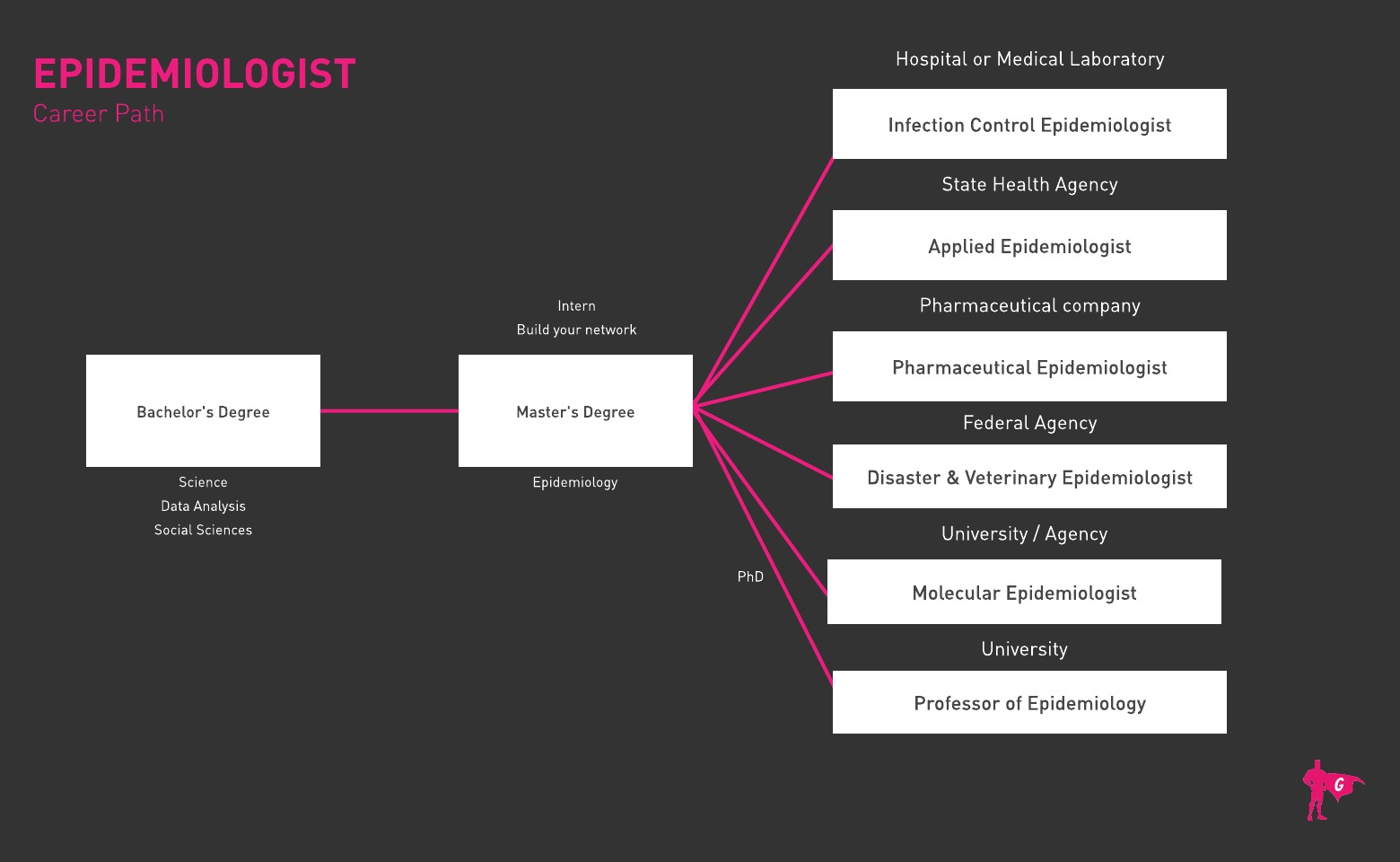Spotlights
Chronic Disease Epidemiologist, Communicable Disease Specialist, Environmental Epidemiologist, Epidemiology Investigator, Infection Control Practitioner (ICP), Nurse Epidemiologist, Public Health Epidemiologist, Research Epidemiologist, State Epidemiologist
An Epidemiologist is a public health professional who helps stop the spread of disease or other negative health outcomes. They do this by researching specific populations. By communicating their findings to public officials, they help determine public policy for preventing disease.
This field uses math and data to investigate the pattern of a health problem. They may be placed in charge of a program to stop a problem’s spread, or may continue to research how to stop a problem from getting worse.
Epidemiologists do not typically collect data directly from patients. They are sent this data by health organizations and try to make sense of it. The goal is to figure out how to prevent a health problem from getting worse as well as how to shrink or eliminate it.
Many people might think an Epidemiologist is mainly concerned with germs and health. However, this role is more concerned with statistical analysis and pattern recognition.
- Competitive salaries
- Consistent need for position
- Impact can be felt on a community-scale – sometimes global
- Complex problem solving with real solutions
This is a full-time profession with a standard Monday-Friday work schedule. Depending on local health concerns, there may be a need for longer hours, or weekend work.
An epidemiologist typically works in an office setting. They spend this time studying data and reports, typically with computer software. There is often a need in community settings to create ways to communicate prevention techniques to the public. Sometimes, an epidemiologist will communicate directly to a newspaper or news station.
There is also a need for field work. Epidemiologists need to help with public surveys, including interviewing residents of a population. Much of their data is collected by assistants, but collecting it directly can provide a better understanding of trends.
In the field or lab, they are trained how to prevent disease transmission. There will be a need to wear personal protective gear.
Soft Skills
- Excellent oral and written communication skills
- Problem solving and critical thinking as well as reasoning
- Sensitivity to problems – knowing when there is one, not necessarily solving it.
- Able to find patterns and recognize what they mean (Statistic/Data Analysis)
- Understanding what makes data good or bad.
- Leadership skills – you will need to lead a team
- Diplomacy/Second Language Skills – You will often need to communicate with professionals in different countries.
- Analytical software, such as HealthMapper (Taught in school, or on worksite)
Technical Skills
- Ability to use word-processing and similar software
- Use of both databases and Spreadsheets (like Microsoft Excel)
- Able to write and administer data-driven surveys
- Very precise and data driven
- Public Health Office
- Laboratory for Government Health Department
- Field Hospitals – Outside
- International Relief Organizations
- Centers for Disease Control and Prevention
- Teaching at University
An epidemiologist is most likely to work for a public health agency in a local, state, or national government. While the majority work in an office setting, many also work in rural communities around the world to collect data.
Even when working for a local health department, you will likely communicate often with people around the world.
An epidemiologist will need a Master’s Degree in Public Health. This means you will need to attend school for close to six years before you are able to apply. Some of these professionals earn a doctoral degree as well, which could take up to ten years total.
Extended time at school means you will need to maintain a high GPA (3.5 or above) in college to have a good chance of being accepted into a Master’s program. Many students work during their education which can mean not much time for social activities.
To advance in this field, find a specialization. Mental health, injury, and chronic disease are a small set of examples for this role. You may also be promoted to a supervisory role in a department. The best practice in this field is to continue taking additional training and attending conferences.
- Improved methods for dealing with health concerns, including gene therapy
- Tighter focus – specific types of viruses, cancer, or similar
- Larger sets of data – making it harder to find the helpful data
- New diseases (Such as COVID-19) will always occur.
Science experiments and studying nature
Counting and measuring – Sports statistics or similar are very fun introductions to data
Asking a lot of questions to learn about problems – very analytical
Biology activities and exploring anatomy
Coding, games with logic puzzles
- Epidemiologists usually complete a Master’s in Public Health (MPH) or similar degree; many finish their PhD and become licensed physicians
- To apply to grad programs, most students finish a bachelor’s in majors such as biology, public policy, or social science
- MPH degrees are generally centered around biostatistics, behavioral studies, immunology, health services, and epidemiological methods
- Per O*Net Online, 60% of Epidemiologists have a master’s and 23% have a PhD
- Common course topics include math, statistics, public health, biological sciences, physical sciences, healthcare systems, medical informatics, and survey design
- Students can expect to complete internships or practicum programs ranging in length. Two common agencies for students to train are the Centers for Disease Control and Prevention and the National Institutes of Health
- In high school, stock up on advanced classes in English, math, statistics, medicine, health, biology, sociology, anthropology, and computer programming
- Look for Epidemiology-related internships in your local area
- Considering volunteer opportunities to help gain experience
- Decide which type of employer you want to work for, such as private industry health insurance, pharmaceutical companies, or nonprofits
- Note, 35% of Epidemiologists work for state government agencies; 19% work for local government, 16% for hospitals, and 10% for colleges and universities
- Consider which specialty you’re most interested in, such as chronic diseases, environmental health, genetic/molecular epidemiology, infectious disease, injuries, maternal health, mental health, public health emergency response, or veterinary epidemiology, among others
- Join professional organizations to learn, grow, and network (see our Recommended Resources > Websites for a list of options)

- BLS projects increased job opportunities, in part due to Covid-19, however since this is a small career field to begin with, there will still be competition
- Most Epidemiologists work for either state or local government agencies. Other large employers include hospitals, colleges, and universities
- Carefully screen job ads to make sure you meet all the listed academic and work history requirements
- Beef up your resume with Epidemiology-related internships and volunteer activities
- Starting with your undergrad degree, connect and build a network with your professors. You will have opportunities to intern both for your Bachelor’s and Master’s degrees. These will connect you with those who hire new epidemiologists. In fact, you can often find entry level work while completing your advanced degree. This will put you in a stronger position to find permanent work when your schooling is completed.
- Create profiles on job portals such as Indeed, Simply Hired, Glassdoor, and Zippia
- Participate with professional organizations (see Recommended Resources > Websites). Attend conferences, give lectures, and make connections
- Inform your network you’re looking for work. Many job opportunities aren’t advertised online
- Go where the jobs are. The states with the highest employment of Epidemiologists are Texas, California, Washington, Colorado, and Massachusetts
- Review Epidemiologist resume templates to get ideas for your resume
- Study Epidemiologist interview questions to prepare for job interviews!
Websites
- American Association for Cancer Research
- American College of Epidemiology
- American Diabetes Association
- American Epidemiological Society
- American Public Health Association
- American Society for Clinical Pathology
- American Society for Microbiology
- American Veterinary Medical Association
- Association for Professionals in Infection Control and Epidemiology
- Association of State and Territorial Health Officials
- Centers for Disease Control and Prevention
- Council of State and Territorial Epidemiologists
- National Academy for State Health Policy
- National Healthcare Safety Network
- National Institutes of Health
- The Society for Healthcare Epidemiology of America
Books
- Epidemiology: Beyond the Basics, by Moyses Szklo and F. Javier Nieto
- Gordis Epidemiology, by David D Celentano ScD MHS and Moyses Szklo MD
- Infectious Disease Epidemiology: Theory and Practice: Theory and Practice, by Kenrad E. Nelson and Carolyn Williams
- Modern Epidemiology, by Timothy L. Lash, Tyler J. VanderWeele, et al.
- Social Scientists
- Head of Public Health Office
- Teaching Professor at University
- Biostatistician
- Research Data Analysis
- Because Epidemiology requires a Master’s Degree, many individuals may be able to find a job using their Bachelor’s Degree if they choose not to move forward. This can provide work as a Data Analyst, Anthropologist, or similar role in their chosen field.
Becoming an Epidemiologist takes good social skills as well as analytical data skills. Being able to speak well with others and logically explain data is very important. This field is concerned with data and facts – you must be able to trust your data, even if it shows you something you don’t like.
There can be a lot of opportunity for travel, meeting many people, and causing positive change around the world. It is very important to be able to focus on your school and build a network. When you are done with school, this network will not only help you find a job, it will also provide resources to do well in the field.
Newsfeed

Featured Jobs

Online Courses and Tools







